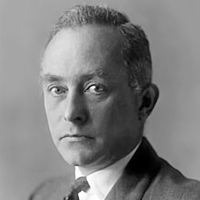Max Born Award
Get Involved
Max Born Award
This award was established in 1982 to commemorate the centenary of Max Born's birth.
Society Connection
Emil Wolf (1978 President and Honorary Member) was a student of Max Born.
Key Funders
United Technologies Research Center, Physical Optics Corporation, Joseph Goodman
About Max Born
 Born, a German physicist and mathematician, conducted fundamental research in quantum mechanics and is known for his statistical interpretation of the wavefunction. He also made contributions to solid-state physics and optics and supervised the work of a number of notable physicists in the 1920s and 1930s.
Born, a German physicist and mathematician, conducted fundamental research in quantum mechanics and is known for his statistical interpretation of the wavefunction. He also made contributions to solid-state physics and optics and supervised the work of a number of notable physicists in the 1920s and 1930s.
He entered the University of Göttingen in 1904, where he found the three renowned mathematicians Felix Klein, David Hilbert, and Hermann Minkowski. He wrote his PhD thesis on the subject of "Stability of Elastica in a Plane and Space", winning the University's Philosophy Faculty Prize. In 1905, he began researching special relativity with Minkowski, and subsequently wrote his habilitation thesis on the Thomson model of the atom. A chance meeting with Fritz Haber in Berlin in 1918 led to a discussion of the manner in which an ionic compound is formed when a metal reacts with a halogen, which is today known as the Born–Haber cycle.
In the First World War, after originally being placed as a radio operator, he was moved to research duties regarding sound ranging due to his specialist knowledge. In 1921, he returned to Göttingen. Under Born, Göttingen became one of the world's foremost centers for physics. In 1925, Born and Werner Heisenberg formulated the matrix mechanics representation of quantum mechanics. The following year, he formulated the now-standard interpretation of the probability density function for ψ*ψ in the Schrödinger equation, for which he was awarded the Nobel Prize in 1954. His influence extended far beyond his own research. Max Delbrück, Siegfried Flügge, Friedrich Hund, Pascual Jordan, Maria Goeppert-Mayer, Lothar Wolfgang Nordheim, Robert Oppenheimer, and Victor Weisskopf all received their PhD degrees under Born at Göttingen, and his assistants included Enrico Fermi, Werner Heisenberg, Gerhard Herzberg, Friedrich Hund, Pascual Jordan, Wolfgang Pauli, Léon Rosenfeld, Edward Teller, and Eugene Wigner.
In January 1933, the Nazi Party came to power in Germany, and Born, who was Jewish, was suspended. He emigrated to the United Kingdom, where he took a job at St John's College, Cambridge, and wrote a popular science book, The Restless Universe, as well as Atomic Physics, which soon became a standard textbook. In October 1936, he became the Tait Professor of Natural Philosophy at the University of Edinburgh. Working with German-born assistants E. Walter Kellermann and Klaus Fuchs he continued his research into physics. During this time, he also worked with Emil Wolf writing the famous textbook Principles of Optics, usually known simply as “Born and Wolf”. Born remained at Edinburgh until 1952. He retired to Bad Pyrmont, in West Germany, and died in Göttingen on 5 January 1970.
